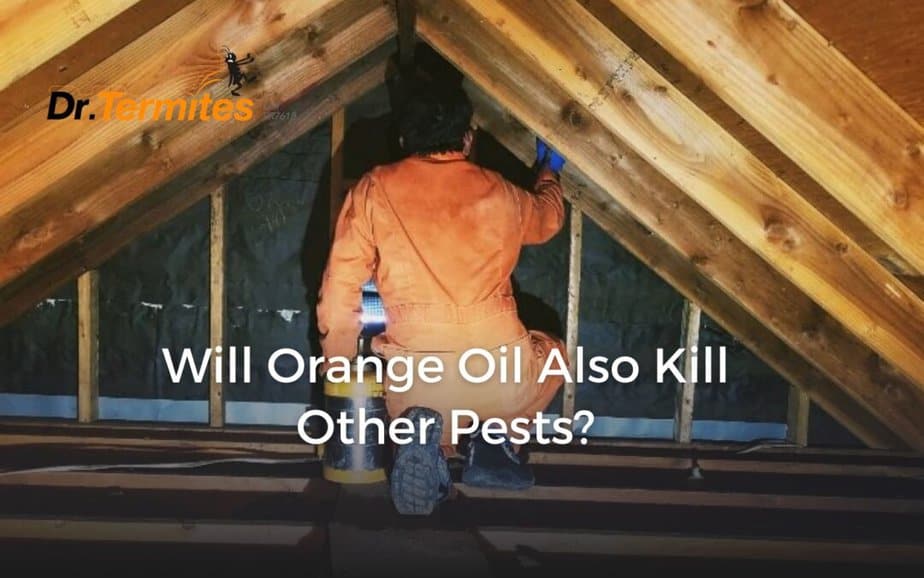
by pestcontrolseos | Jun 6, 2024 | Blog
Pest control is a concern for many homeowners. Among various solutions, orange oil has become quite popular due to its natural and non-toxic properties. But does orange oil only work on termites, or can it also be effective against other pests? Let’s talk about how orange oil works for pest control and see if it can handle other common household pests too.

How Does Orange Oil Work?
Orange oil is derived from orange peels and contains a compound called d-limonene. Folks have come to trust the power of this particular mixture. The capability of getting rid of unwanted insects and critters. By damaging their cell walls, they essentially choke and die from lack of air. The natural oil is very acidic, and this acidity can actually dissolve the exoskeletons of insects. It works as a great pest control solution without needing any harsh chemicals.
Benefits of Using Orange Oil
One of the main benefits of using orange oil for pest control is that it is a natural product. It is safe to use around children and pets, and it does not leave harmful residues in your home. Additionally, orange oil has a pleasant citrus scent, which can help keep your home smelling fresh.
Another benefit is that orange oil is biodegradable, meaning it will break down over time and not harm the environment. This makes it an eco-friendly option for those looking to reduce their environmental footprint.
Orange Oil and Termite Control
Orange oil is most commonly used for termite control. Termites are notorious for damaging wooden structures, and traditional chemical treatments can be harmful to both humans and the environment. Orange oil provides a more natural and less invasive alternative.
How Effective Is Orange Oil Against Termites?
Studies have shown that orange oil can be quite effective in killing termites. It works by being injected into the wood where termites are present, and the d-limonene in the oil attacks the termites’ respiratory system. Over time, this leads to their death. While it may not completely replace traditional termite treatments, it can be a valuable part of an integrated pest management approach.
Can Orange Oil Kill Ants?
Ants are another common household pest that can be difficult to control. Fortunately, orange oil can also be effective against ants. The d-limonene in the oil disrupts the ants’ ability to communicate and navigate, leading to their death.
Application Methods for Ant Control
To use orange oil for ant control, you can create a spray solution by mixing orange oil with water. Spray this solution directly onto ant trails and entry points around your home. You can also soak cotton balls in the solution and place them near ant nests or areas where ants are frequently seen.
Is Orange Oil Effective Against Spiders?
Spiders are often unwelcome guests in homes. While they are beneficial in controlling other insects, many people prefer to keep them out of living spaces.
How Orange Oil Affects Spiders
Orange oil can repel and kill spiders when applied directly. The strong citrus scent and the d-limonene content make it an effective spider deterrent. However, it is important to note that orange oil may not provide long-term control, as it can evaporate and lose its potency over time.
Orange Oil for Cockroach Control
Cockroaches are among the most dreaded pests due to their resilience and ability to spread diseases. Orange oil can be used to control cockroach populations effectively.
Application Tips for Cockroach Control
To manage cockroaches, apply orange oil directly to areas where they are commonly found, such as under sinks, behind appliances, and in cracks and crevices. The oil can kill cockroaches on contact and deter them from returning to treated areas.
Orange Oil and Flea Control
Fleas are a common problem for pet owners. These tiny pests can cause significant discomfort to both pets and humans.
Using Orange Oil to Treat Fleas
Orange oil can be used to treat fleas by creating a spray solution. Mix the oil with water and spray it onto carpets, pet bedding, and other areas where fleas are present. The d-limonene will kill adult fleas and disrupt their life cycle.
Safety Considerations
While orange oil is generally safe for use around humans and pets, it is still important to handle it carefully. Always read and follow the manufacturer’s instructions and avoid direct contact with skin or eyes. If you have any concerns about using orange oil, consult with a pest control professional.
Unlocking the Power of Orange Oil: Nature’s Answer to Safe Pest Control
Orange oil is a versatile and natural solution for pest control. While it is most commonly used for termite control, it can also be effective against a variety of other pests, including ants, spiders, cockroaches, and fleas. Its natural properties make it a safe and eco-friendly option for homeowners looking to manage pests without resorting to harsh chemicals.
Ready to ditch pests naturally? Dr. Termites offers eco-friendly, safe pest control. Specializing in orange oil treatments for termites and more, we keep your home comfy and pest-free. Don’t let pests rule your space – contact Dr. Termites for professional, natural solutions and enjoy peace of mind.
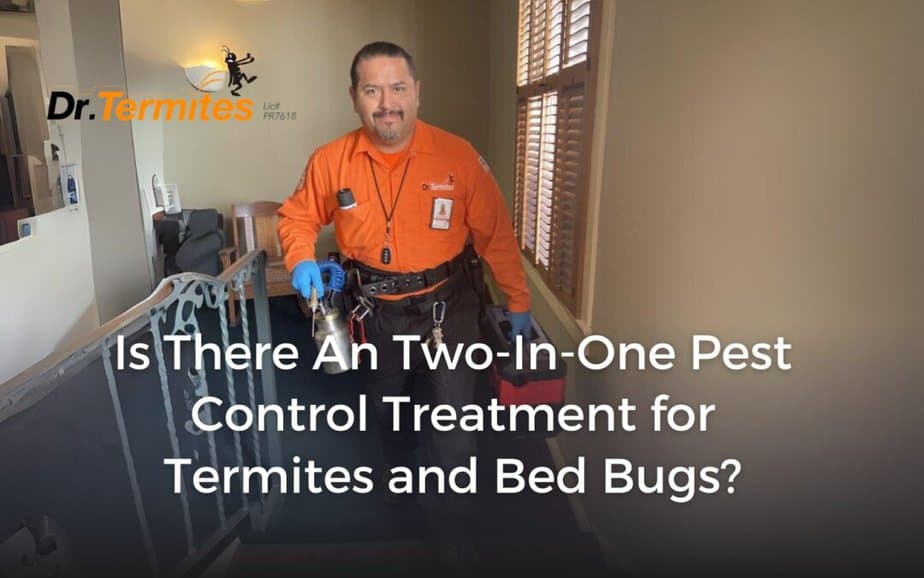
by pestcontrolseos | May 8, 2024 | Bed Bugs, Blog
Dealing with pests at home can be a tough challenge, especially when you’re facing termites and bed bugs. These two bugs are the kind people worry about the most because they can ruin things and make us feel bad.
While termite control focuses on preventing structural damage, bed bug control is about ensuring your living spaces remain comfortable and bite-free. The big question many ask is whether there’s a one-stop solution that can handle both these pests together. This blog post wants to make things clear and simple about this problem.
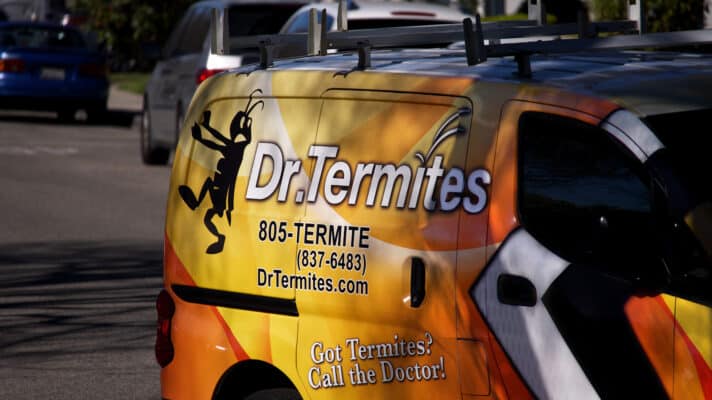
website banner
Challenges of Termite and Bed Bug Control
The Unique Nature of Termites and Bed Bugs
The main hurdle in combating termites and bed bugs is their vastly different lifestyles and impacts. Termites eat wood in a way that can make houses weak. They eat the wood from the inside. On the other hand, bed bugs pose a direct discomfort to humans, living in mattresses and furniture and emerging at night to feed on human blood. Their special ways of acting mean we need special plans to deal with them right.
The Complexity of Effective Treatment
Creating an effective plan for termite or bed bug elimination involves understanding the extent of infestation and the best methods for treatment. For termites, we aim to hit the main group and stop them from coming back. For bed bugs, we try to get rid of them where we live without hurting people. This is hard because one simple fix doesn’t work for all.
Finding a Balance Between Safety and Efficiency
Safety is a paramount concern when treating homes for pests. Using chemicals needs to be done with care to make sure they are strong enough to get rid of bugs but won’t make people sick. This tricky job makes it harder to find good ways to control pests, and it needs someone who really knows what they’re doing to do it well.
Examining Current Pest Control Solutions
Termite Control Methods
Termite control often involves chemical barriers or bait systems to eliminate termites and protect property. These ways stop the bug group from causing more trouble by making a safe ring around your house. Choosing between walls and food traps depends on how bad the bug problem is and what your house needs, making sure the fix works well for a long time. This plan keeps your house strong and offers a lasting answer to termite problems.
Bed Bug Control Techniques
Controlling bed bugs requires a hands-on approach due to their elusive nature and resistance to common pest control methods. Heat treatment works by making your home very hot to kill all bed bugs, even in tiny hidden spots. Or, using special chemicals can also kill them by hitting where they hide, but we must be careful not to hurt people living there.
Both ways try to reach everywhere to get rid of bed bugs for good. Doing it right is important to make sure all these bugs are gone.
The Possibility of Dual-Action Treatments
Currently, most pest control solutions are designed to target either termites or bed bugs due to their unique behaviors and habitats. Even so, we’re still looking for one treatment that can handle both bugs at the same time. The tough part is making one fix that meets the different needs of each bug problem at once.
Innovative Approaches to Combined Pest Control
Innovative pest control companies are working on solutions that aim to address multiple pest issues simultaneously. This could mean using new kinds of bug-killing chemicals or plans that stop bugs before they start as well as getting rid of them. But, how well these methods work and if you can get them might change. It’s still key to talk to a bug expert who can look at your exact problem.
Considerations for Homeowners
Choosing the right pest control method requires understanding your own needs and the extent of your pest problem. A professional can provide guidance on whether a combined treatment is a good option or if targeted approaches would be more effective.
Winning the Battle Against Termites and Bed Bugs: Future-Proof Strategies for a Pest-Free Home
While the idea of a two-in-one pest control treatment for termites and bed bugs is appealing, the reality is complicated by the distinct nature of these pests. Currently, most effective treatments target one pest at a time. But, as bug-fighting tools get better, we might find better ways to deal with them later on. Right now, the smartest move is to team up with a bug expert to figure out the best plan for your house.
At Dr. Termites, we understand the challenges homeowners face with these pests and offer specialized services for termite and bed bug control. Our team of smart people can check out your problem and use the best way to keep your house free from bugs.
If you have these bugs or think they might be in your place, don’t wait until it gets really bad. Contact Dr. Termites today and take the first step towards a pest-free home. We’re here to give you the help from smart people you need.

by pestcontrolseos | May 5, 2024 | Blog
Orange oil is effective in combating termites, but several gardeners are concerned about whether it’s safe for plants. Let’s dive into the right way to bring orange oil close to your plants without causing them harm. We’ll talk about the good and bad points of using orange oil on plants to stop termites and give you simple tips for using it safely.

How is Orange Oil Produced?
Orange oil, a natural termite control agent, comes from the rinds of oranges. The process is straightforward yet effective. First, orange peels are collected and ground to release their oils. Then, through a method called cold pressing, the oils are extracted from the mashed peels. The way we keep the oil means its superhero properties stay put, ready to take down termites with ease.
The oil is cleaned more to make it pure for use against termites and for other uses. This makes sure the final product is strong and without any dirty parts. Turns out, fighting termites in both your garden and living spaces doesn’t have to involve nasty chemicals. A natural, strong approach does the trick just fine. With orange oil, gardeners and people who own homes can fight pests well while also looking after the environment.
The Power of Orange Oil in Termite Control
Orange oil targets termites with its active component, d-limonene. Touch this stuff, and termites drop like flies. When termites are exposed to orange oil, the d-limonene disrupts their cell membranes, leading to a loss of proteins and essential bodily fluids. So, termites just can’t keep themselves hydrated or energized, which pretty quickly leads to them kicking the bucket.
Also, orange oil works well in getting to termites hidden deep in wood without a lot of drilling or messing up the property. Sneaking into every corner of the woodwork comes naturally to this method, winning over hearts of those homeowners who keep our planet in mind. By putting orange oil in places where termites are often found, you can cut down and get rid of termite groups in a way that’s safe for your house and better for the environment around you.
However, the burning issue for our green spaces is this: But, could this awesome fix end up hurting the very plants we pour our hearts into?
How Orange Oil Affects Plants
When considering orange oil for termite control, it’s important to know how this substance interacts with your garden plants. In most scenarios, orange oil, when used properly, does not significantly harm plants. The concentration of the orange oil solution is key—too strong a solution can damage or burn plant leaves.
Tips for Plant-Safe Use
To keep your garden safe while using orange oil:
- Follow the mixing directions specifically meant for garden scenarios.
- Target the application only on areas affected by termites, avoiding direct contact with plants as much as possible.
- Conduct a small patch test on a plant to check for any adverse reactions.
- Choose cooler times for application to minimize the risk of evaporation that can increase concentration levels and risk to plants.
Following these directions, you can apply orange oil close to your plants safely, making sure your garden remains rich and full of life.
Alternatives to Direct Application
If you’re cautious about using orange oil near your plants, there are ways to incorporate it into your termite control plans without direct application.
- Barrier Methods: Apply orange oil to the soil around plants, creating a barrier termites won’t cross.
- Spot Treatment: Use orange oil directly on termite-infested wood structures rather than in the soil or on plants.
Monitoring Plant Health
After using orange oil in your garden, keep an eye on your plants. Check for signs of stress, like leaves going yellow or sagging. If you see any bad changes, change how much orange oil you use. Think about talking to a gardening expert for advice just for you.
Effective Termite Control with Orange Oil: A Safe Method for Your Garden
Orange oil can be a safe and effective way to control termites without harming your plants, provided it’s used wisely. Remember, the key is in the concentration and method of application. So there you have it, follow these steps and say goodbye to termite worries without sacrificing your garden’s vibrancy. Your plants can continue to grow healthy and strong, alongside the effective termite control that orange oil provides.
If you’re unsure about how to use orange oil without harming your plants, or if you need help with termite control, our team at Dr. Termites is here to help. We all know the drill – along with nurturing plants, guarding them from pests is key. Reach out to us now, and we’ll help your garden stay a secure place for plants and keep termites at bay. Make your home and garden secure with Dr. Ah, termites – those little critters that can turn your home into their munching ground.
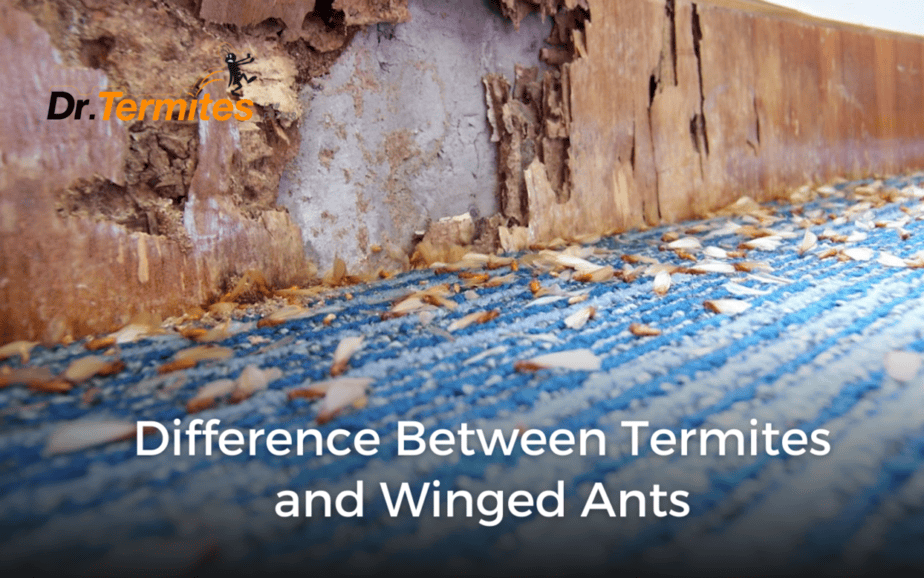
by pestcontrolseos | Apr 25, 2024 | Blog, Pest Info & Articles
The appearance of winged insects inside your home can often lead to confusion. Are they termites or winged ants?
While at a glance they might seem similar, numerous differences exist between these two species. Recognizing these differences is crucial for homeowners, as the presence of one over the other can significantly impact the approach to pest management.
This blog post will provide a detailed comparison to help you identify whether you’re dealing with termites or winged ants, aiding in effective termite control.
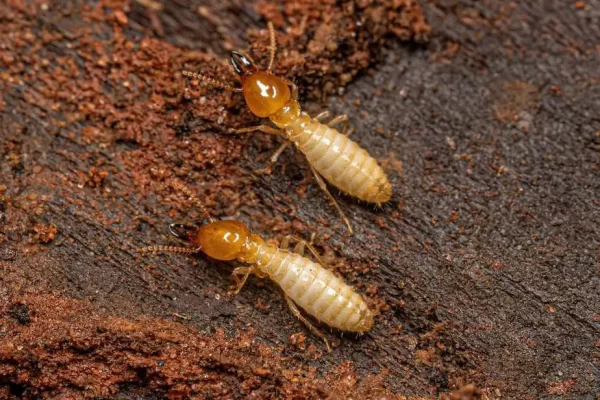
Physical Differences
Body Shape
One of the most noticeable differences lies in their body shapes. Termites have a relatively uniform body width from head to abdomen, giving them a more cylindrical appearance. On the other hand, winged ants exhibit a pronounced constriction at their waist, creating a distinct division between their thorax and abdomen, which gives them a pinched waist look.
Antennae
Another key feature to observe is the antennae. Termites possess straight antennae that appear bead-like in structure. In contrast, winged ants have elbowed antennae, which bend at an angle and are often longer compared to those of termites.
Wing Size and Shape
Both termites and winged ants have two pairs of wings, but the similarities end there. For termites, all four wings are of equal size and shape, and they are much longer than their body. These wings are also translucent with a delicate, almost filmy appearance. Winged ants, however, have a noticeable difference in the size of their wings. Their front pair of wings are larger and more robust than the rear pair, and the wings are not as proportionally long as those of termites when compared to their body length.
Color
While color can vary significantly within species, it can still serve as a helpful indicator. Generally, termites tend to be lighter in color, ranging from white to light brown. Winged ants, especially common varieties such as carpenter ants, are usually darker, with colors spanning from black to dark brown.
Behavioral Differences
Beyond the physical distinctions, termites and winged ants exhibit notable differences in their behavior, which can aid in identification and understanding of their impact on your home.
Nesting Habits
Termites are known for building their colonies underground or within wooden structures, creating elaborate tunnel systems. This behavior is a significant reason why termite infestations can go unnoticed until substantial damage has been done. Winged ants, however, typically establish their nests in moist areas or rotting wood outside and occasionally venture into homes in search of food.
Swarm Behavior
Swarming is a common reproductive activity for both termites and winged ants, but the timing and nature of these swarms can differ. Termites tend to swarm in the spring, especially after a rain shower when humidity is high. Ants might also swarm during warmer months, but their swarming doesn’t have the same predictability in terms of timing and environmental conditions.
Diet Preferences
The diet is a clear indicator of their differing behaviors. Termites consume cellulose, primarily found in wood, making them notorious for damaging wooden structures. Winged ants, on the other hand, have a more varied diet that can include sweets, proteins, and even other insects, reducing their direct threat to the structural integrity of buildings.
Significance of Correct Identification
Understanding whether you’re dealing with termites or winged ants is critical because of the potential damage they can cause. Termites are capable of causing significant structural damage to homes by eating wood, while winged ants are less likely to cause such extensive harm.
Correctly identifying these pests is the first step in implementing effective termite control measures. Knowing you’re dealing with termites can prompt swift action, potentially saving homeowners considerable repair costs.
Termites vs. Winged Ants: The Key to Protecting Your Home from Unseen Invaders
Distinguishing between termites and winged ants is essential for homeowners looking to protect their properties from unnecessary damage. By paying attention to physical and behavioral differences, such as body shape, antenna structure, wing size, and swarming habits, you can accurately identify these pests.
Proper identification is the cornerstone of effective pest management and is particularly crucial for implementing successful termite control strategies. If unsure, consulting with a pest control professional can provide peace of mind and ensure that your home remains safe from these potentially damaging insects.
At Dr. Termites, we understand the urgency and importance of accurate pest identification and prompt, effective treatment. Our team is equipped with the knowledge and tools needed to respond to your termite control needs efficiently. If you’re facing uncertainty about the type of pest in your home, or if you’ve identified termites and need immediate action, Dr. Termites is ready to assist.
Protect your home from termites with Dr. Termites. Get a comprehensive inspection and customized control solutions for lasting protection. Your peace of mind is our commitment.
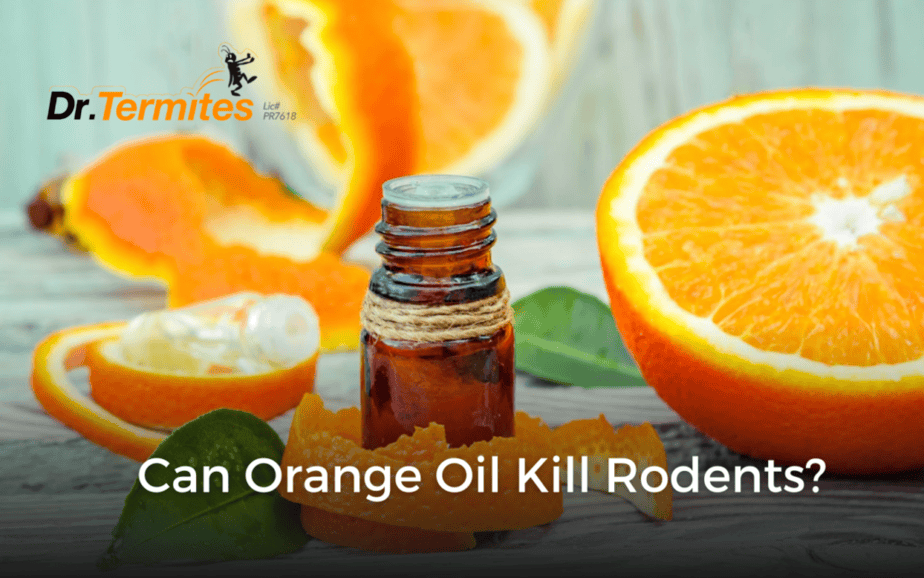
by pestcontrolseos | Apr 17, 2024 | Blog, Pest Info & Articles
Rodents are unwelcome guests in any home, causing damage and potentially spreading diseases. Traditional rodent control methods often involve harsh chemicals or inhumane traps, leading many to seek more natural and humane solutions. One such potential solution that has gained attention is the use of orange oil.
This blog post explores whether orange oil can effectively kill or repel rodents and how it compares to other pest control methods.
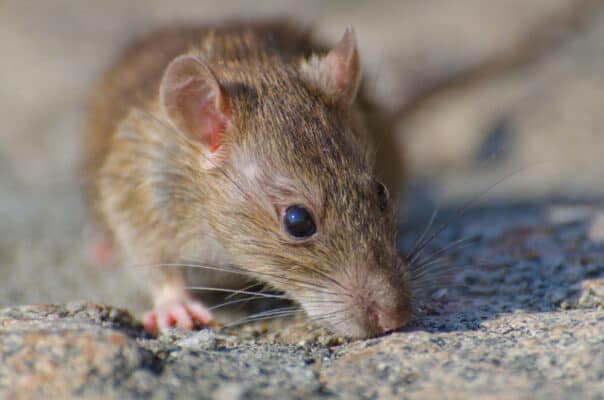
Understanding Orange Oil and Its Properties
Orange oil, a natural extract derived from the peels of oranges, is celebrated not only for its refreshing scent but also for its diverse range of applications, from cleaning products to pest control solutions. Understanding the unique properties of orange oil is key to unlocking its potential in various uses, including its role in managing rodent populations.
What is Orange Oil?
Orange oil is obtained through a process called cold pressing, where the oil is extracted from the rind of the orange fruit.
This essential oil is rich in d-limonene, a compound that contributes to its citrusy aroma and is thought to be responsible for many of its beneficial properties. Its pleasant smell and natural origin make it a popular choice for those seeking eco-friendly alternatives to synthetic chemicals.
The Science Behind Orange Oil and Rodents
The effectiveness of orange oil against rodents can be attributed to its strong scent and the presence of d-limonene. Research suggests that rodents, which rely heavily on their sense of smell for navigation and identifying food sources, may find the intense citrus aroma of orange oil overwhelming or unpleasant, leading to its potential as a natural repellent.
Additionally, d-limonene has been studied for its insecticidal and pesticidal properties, hinting at orange oil’s broader applications in pest control beyond just its olfactory impact.
The Effectiveness of Orange Oil in Rodent Control
Repellent vs. Lethal Effects
While there is evidence to suggest that orange oil can repel rodents, its ability to kill them is less clear. The primary action of orange oil in pest control is through deterrence, by making environments less attractive to rodents due to the strong scent and possibly affecting their behavior or health when in contact with concentrated forms.
Research Findings on Orange Oil and Rodents
Some studies have indicated that orange oil could influence rodent behavior and health, potentially reducing their presence in treated areas. However, these effects are more about repelling than outright killing.
The direct lethal effect of orange oil on rodents has not been conclusively proven and may require concentrations higher than what’s typically used for household pest control.
How to Use Orange Oil for Rodent Control
DIY Solutions and Precautions
For those interested in trying orange oil as a rodent repellent, creating a diluted spray solution is one approach. Mixing orange oil with water and spraying it around areas of your home where rodents are a problem can help deter them. However, it’s crucial to use the correct concentration to avoid damaging surfaces or harming pets.
Professional Pest Control Services
For more severe rodent infestations, professional pest control services may offer solutions that include the use of orange oil among other methods. These professionals can ensure the safe and effective application of orange oil, maximizing its repellent effects while minimizing risks.
Benefits and Limitations of Using Orange Oil for Rodents
Advantages of Orange Oil in Pest Control
The use of orange oil for rodent control offers several benefits, including its natural origin, pleasant scent, and lack of harsh chemicals. It provides a more environmentally friendly and potentially safer alternative to traditional pest control methods.
Challenges and Considerations
However, there are limitations to using orange oil as a sole method for rodent control. Its primary action is repellent rather than lethal, and its effectiveness can vary depending on the severity of the infestation and how it’s applied. Additionally, repeated applications may be necessary to maintain its deterrent effect.
Harnessing Orange Oil: A Natural Solution for Rodent Repellent
The path to achieving a rodent-free environment may appear challenging; however, the promise of natural solutions such as orange oil presents a viable option. While it may not eliminate rodents directly, its repellent qualities and natural composition render it an appealing choice for individuals pursuing a safer and more humane method of pest management. The efficacy of orange oil, when applied strategically, plays a crucial role in controlling and diminishing rodent populations within residential spaces.
Dr. Termites specializes in eco-friendly pest control, expertly integrating natural solutions like orange oil to keep homes safe and rodent-free. We specialize in combining innovative, eco-friendly pest control solutions with professional expertise to ensure your home remains safe, comfortable, and rodent-free.
Don’t let rodents disrupt your peace. Reach out to Dr. Termites for a consultation. Our team is ready to create a pest control plan using natural solutions like orange oil for safe and effective results. Let’s work together for a rodent-free home that also cares for the environment. Start your journey to a cleaner, greener home with Dr. Termites.
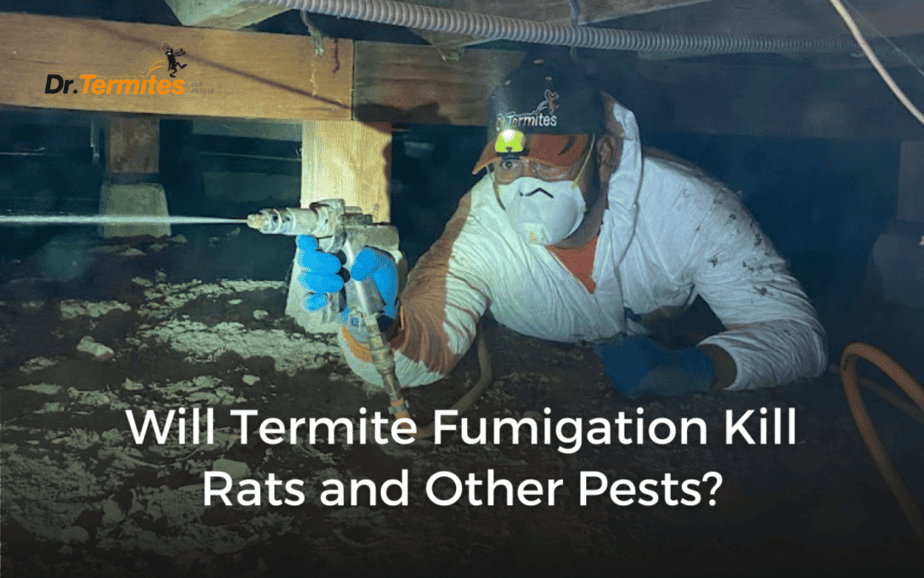
by pestcontrolseos | Apr 4, 2024 | Blog, Pest Conrol
When homeowners consider termite control, their primary concern is to protect their property from the destructive power of termites. However, homes are ecosystems that harbor various pests, including rodents like rats.
The question arises: Can the process used to eradicate termites also impact rats and additional unwanted creatures? This blog post examines the efficacy of termite fumigation in dealing with rats and other pests, providing a comprehensive overview of what homeowners can expect.
The Essence of Termite Fumigation
What is Termite Fumigation?
Termite fumigation, a pest control technique, employs gas pesticides to eliminate termites in infested structures. It’s highly effective for extensive, hidden infestations, as it reaches termites in areas otherwise inaccessible. This method ensures that even the most secluded termites are targeted, providing a comprehensive solution to termite problems.
How Does It Work?
The fumigation process involves enclosing the infested structure, often with a tent, before introducing a fumigant gas. This gas is allowed to permeate the structure for 24 to 72 hours, reaching into cracks, crevices, and wood where termites reside. This method ensures that the termites are effectively eradicated, providing a thorough solution to termite infestation by targeting their hidden sanctuaries and eliminating them completely.
Impact on Rats and Other Pests
Will Rats Be Affected?
Rats, as mammals, differ physiologically from insects such as termites. Fumigation gasses lethal to termites might not always be as effective against rats. However, if rats are inside a structure during termite fumigation, the high concentration of fumigant needed to exterminate termites could also prove fatal to rats. This highlights the importance of considering all occupants of a structure when planning fumigation treatments.
Other Pests and Considerations
Termite fumigation targets not just termites and rats but also household pests like cockroaches, bedbugs, and ants. However, its effectiveness depends on the pest’s lifecycle and fumigant concentration. To fully eradicate a range of pests, it’s often essential to employ additional, targeted pest control techniques. This ensures a comprehensive approach to pest management, addressing various life stages and species for more effective control.
Factors Influencing Fumigation Effectiveness
Sealing and Preparation
The effectiveness of fumigation in eliminating pests greatly depends on the quality of home sealing and preparation prior to commencement. Ensuring proper sealing is crucial as it guarantees the fumigant gas penetrates all possible pest-hiding places, significantly increasing the chances of a successful pest eradication process.
Concentration and Exposure Time
The effectiveness of fumigation largely depends on two critical factors: the concentration of the fumigant used and the duration of exposure. Utilizing higher concentrations and allowing for longer exposure periods significantly enhances the probability of eradicating a broader spectrum of pests, making these parameters essential for successful pest control efforts.
Integrated Pest Management (IPM)
A Holistic Approach
Integrated Pest Management (IPM) is a comprehensive approach that blends biological, cultural, physical, and chemical methods to reduce health, environmental, and financial risks. It emphasizes long-term prevention and control of various pests, such as termites and rats, aiming to achieve effective pest management while minimizing potential negative impacts. By adopting IPM strategies, we can efficiently address pest-related challenges in a sustainable and responsible manner.
Implementing IPM in Your Home
Effective pest management via Integrated Pest Management (IPM) starts with prevention. Homeowners should regularly maintain their homes to seal potential entry points and minimize moisture and clutter, which attract pests. It’s also crucial to monitor pest activity regularly. Early detection through monitoring allows for timely intervention, preventing small issues from escalating into severe infestations. Adopting these proactive measures ensures a healthier, pest-free home environment.
Maximizing Pest Control: The Role of Termite Fumigation and Integrated Pest Management Strategies
Termite fumigation is a powerful method for eradicating termites, and it can also impact rats and other pests present in the treated structure. However, its effectiveness varies depending on several factors, including the type of pest and the concentration of the fumigant. For comprehensive pest control, homeowners should consider Integrated Pest Management (IPM) strategies that address the broader spectrum of potential invaders. By combining preventive measures, regular monitoring, and targeted interventions, you can maintain a pest-free home, safeguarding your property and health.
At Dr. Termites, we specialize in offering holistic pest solutions that cater to the unique needs of your home. Our expertise in Integrated Pest Management (IPM) allows us to provide preventative strategies, precise monitoring, and targeted interventions designed to keep your home safe from termites, rats, and a variety of other pests.
Maintaining a pest-free environment is crucial for protecting your property and health. If you’re encountering pest issues or seeking to prevent future infestations, let Dr. Termites be your partner in pest control. Contact us today to schedule a consultation and learn how our services can bring peace of mind and lasting protection to your home.









































